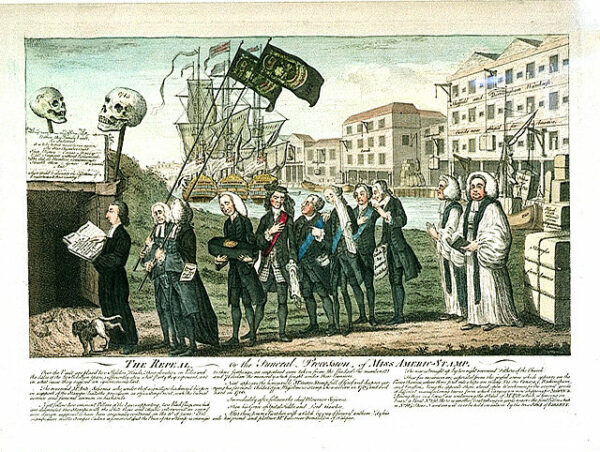On March 22, 1765, the British Parliament passed a law that helped launch the American Revolution. Known as “Stamp Act,” The Gilder Lehrman Institute of American History writes that it was enacted “to help pay for British troops stationed in the colonies during the Seven Years’ War. The act required the colonists to pay a tax, represented by a stamp, on various forms of papers, documents, and playing cards. It was a direct tax imposed by the British government without the approval of the colonial legislatures and was payable in hard-to-obtain British sterling, rather than colonial currency. Further, those accused of violating the Stamp Act could be prosecuted in Vice-Admiralty Courts, which had no juries and could be held anywhere in the British Empire.”
“The debate over the Stamp Tax in early 1765 in Parliament was contentious. On the floor of Parliament, an Irishman, John Barre, deeply opposed the proposed tax on the American colonies and questioned Parliament’s motives,” according to The Constitution Center.
“As soon as you began to care about them, that care was exercised in sending persons to rule over them, in one department and another… sent to spy out their liberty, to misrepresent their actions and to prey upon them; men whose behavior on many occasions has caused the blood of these sons of liberty to recoil within them,” Barre said, coining the phrase that would be used back in the Colonies by a group of protesters.
The Constitution Center continued, “The Sons of Liberty were formed in early 1765 in Boston and New York as concerns grew among colonists about more taxes and more control by the British government. On March 22, 1765, British Parliament finally passed the Stamp Act or Duties in American Colonies Act. It required colonists to pay taxes on every page of printed paper they used. The tax also included fees for playing cards, dice, and newspapers.
The reaction in the colonies was immediate. The protests were based on the legal principle that the colonial legislatures only had the power to tax residents who had representatives in those legislatures. That summer, Massachusetts called for a meeting of all the colonies – a Stamp Act Congress – to be held in New York in October 1765. Committees of Correspondence were also formed in the colonies to coordinate protests against the Stamp Act.”
The British were caught completely off guard by the “the avalanche of protest from the colonists, who effectively nullified the Stamp Act by outright refusal to use the stamps as well as by riots, stamp burning, and intimidation of colonial stamp distributors,” notes Britannica.
“In addition to tarring and feathering stamp agents, the Sons of Liberty sacked homes and warehouses of the wealthy, whom they presumed were favourites of the royal governors. Colonists passionately upheld their rights as Englishmen to be taxed only by their own consent through their own representative assemblies, as had been the practice for a century and a half.
In the set of resolutions against the act that he created for the town of Braintree, Massachusetts, John Adams wrote, ‘We have called this a burdensome tax, because the duties are so numerous and so high, and the embarrassments to business in this infant, sparsely settled country so great, that it would be totally impossible for the people to subsist under it, if we had no controversy at all about the right and authority of imposing it…We further apprehend this tax to be unconstitutional. We have always understood it to be a grand and fundamental principle of the constitution that no freeman should be subject to any tax to which he has not given his own consent, in person or by proxy.’
In addition to nonimportation agreements among colonial merchants, the Stamp Act Congress was convened in New York (October 1765) by moderate representatives of nine colonies to frame resolutions of “rights and grievances” and to petition the king and Parliament for repeal of the objectionable measures. Because they were more conservative in their response to the act than colonial legislatures had been, some of the delegates to the congress refused to sign even the moderate petitions that resulted from their gathering, which was the first intercolonial congress to meet in America. In spite of the petitions’ mildness, Parliament rejected them.”
The British could only hold out for so long. Facing pressure from merchants and manufacturers who were losing money as their exports declined, Parliament eventually repealed the act in 1766 while also passing the Declaratory Act, which insisted that the British had the right to tax anywhere in the empire “in all cases whatsoever.”
The Stamp Act helped unite the North American colonies and the snowball of revolution started rolling faster down the mountain on this day in 1765.






